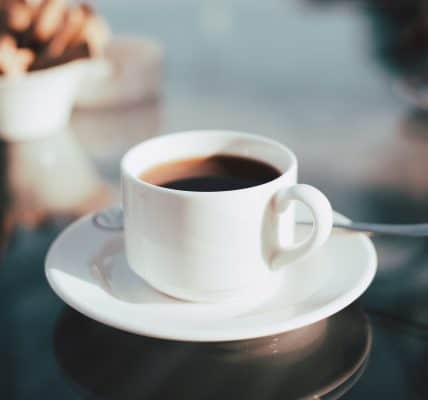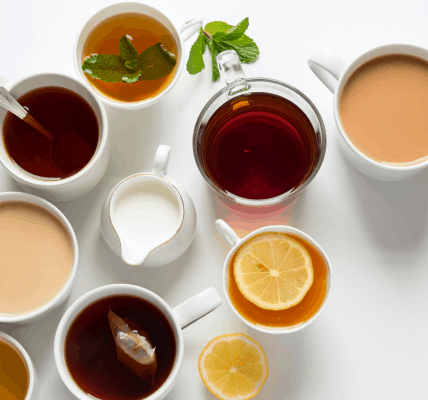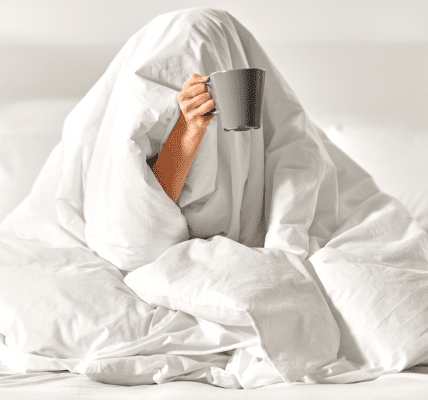We often associate caffeine with coffee only. But you see, there is a long list of plants and foods that contain a considerable amount of caffeine. Green tea, Guarana, almost all energy drinks, and even chewing gums contain caffeine. And, on top of the list is our Matcha.
Though originally from China, the production center of Matcha has been largely shifted to Japan. With tourism in Japan, Matcha grew in popularity too and has become a trendy, healthy beverage today.
Although it comes from the same famous tea plant Camellia Sinensis, it has a distinct, soothing, fun flavor that easily goes with bakery items and desserts too.
We will be talking about the caffeine content present in Matcha. What makes it a notch higher in health standards than the caffeine in Coffee? What sets Matcha apart from Coffee and Regular Green Tea?
How much Caffeine content does Matcha offer?
Table of Contents
The caffeine content in one serving of matcha green tea is less than one standard serving of coffee. Let’s see how.
A 2-ounce cup of Matcha green tea makes one serving. And it is made using one teaspoon of finely ground Japanese green leaves, Matcha in 2 ounces of hot water. That means one Matcha serving has 2 grams of Matcha powder, which is almost 60-70 mg of caffeine, on average.
Some studies show one gram of Matcha to contain anywhere between 19 and 38 mg of caffeine per gram of Matcha. So, we have a range of possible caffeine amounts in one serving, from 38 to almost 88 mg for the standard serving.
The wide range means that the caffeine content of your cup of Matcha can vary due to many factors:
- The type or brand of Matcha you are using. For instance, Matcha obtained from the shade-grown plants will provide greater caffeine.
- The finer the ground, the more caffeine.
- Tea to water ratio you like to use.
- Your water temperature and brewing time. For a more powerful punch of caffeine, let it steep a bit longer.
One standard cup of coffee contains between 70-140 mg of caffeine, depending on the type you are having.
In effect, one cup of Matcha cannot exceed 88 mg of caffeine, which is way less than the upper limit of caffeine in a cup of coffee. This moderate caffeine content and immense health benefits are the reasons why Matcha is getting all famous and trendy.
How is Matcha different from Coffee?
Let’s talk about it from the moment they stimulate our taste buds.
Matcha is described to have a basic, earthy, and somewhat herbal taste and aroma. Some folks also call it ‘grassy.’ We adore coffee for its nutty, chocolaty taste, which is mildly sweet and a bit bitter. While Matcha is not that diverse in tastes and flavors, coffee is. Depending on the roast or coffee beans you are using, coffee can go from sweet and chocolaty to bitter, bold, and complex.
Apart from the taste, what really sets them apart is their chemistry. Coffee has immense health benefits for its caffeine and antioxidant-rich chemistry. While overconsumption can be a health hazard with both, caffeine in coffee has a smaller safe range. That is because each serving has almost two times the caffeine content as in Matcha Green Tea.
Matcha is known for the same caffeine too. But it also has some unique compounds such as L-theanine and EGCG (Epigallocatechin gallate). L-theanine is the amino acid solely responsible for the flavor profile of Matcha Green tea, in fact, all types of tea. Besides, L-theanine is known for its health benefits such as:
- Lowers blood pressure
- Relieves anxiety
- Weight loss
- Boosts immune system
About EGCG, we are getting to it. So, alongside the benefits of a mild amount of caffeine, matcha brings you two more unique but health-beneficial compounds: L-theanine and EGCG.
Besides, Matcha has a great edge over coffee in that it is not acidic at all, unlike coffee.
Is Caffeine in Matcha better than that in Coffee?
Both drinks contain caffeine, just in different quantities. Does the same drug function differently in different beverages?
Yes, it does. Caffeine in Matcha is safer than that in coffee. Firstly, due to the obvious reason: Matcha has half the amount of caffeine as in coffee, which makes it easier to keep tabs.
Secondly, Caffeine in Matcha comes with L-theanine. Apart from the additional brain-stimulating benefits of L-theanine, it slows down the breakdown or metabolism of caffeine.
Another probable mechanism says that L-theanine slows caffeine intake by the brain. So, while coffee gives you the sudden energy spike, Matcha tends to do that in a slower, more sustainable fashion.
A study shows that caffeine reaches peak levels in the blood within 15 to 60 minutes after oral ingestion of coffee. The range is wide, and it has various reasons, such as an individual’s gut health, gastric emptying, and rate of liver metabolism. With caffeine in Matcha, peak levels reach slowly, and caffeine continues to be added to blood for a longer time.
That’s why a term called ‘caffeine crash’ or ‘coffee crash’ is used with coffee drinkers. After the first sudden caffeine spike in the blood and brain, the effect subsides within a few hours. And you feel totally drained of energy, fatigued, and tired. Concentration levels drop drastically, and irritability sets in. This does not happen with your Matcha.
How are Matcha and Green Tea Different?
Matcha green powder and green tea are obtained from the same plant Camellia Sinensis, but we know that both have major differences.
Let’s start with their cultivation method: Matcha green powder is obtained from shade-grown plants. This is what makes it richer in caffeine, and plant pigments and chemicals, hence the rich green color and distinct flavor.
Due to conventional methods of cultivation, especially the sun factor, green tea has a more fresh, delicate flavor. Also, while green tea brings you the essence of tea plant leaves, Matcha tends to bring the whole leaf. That is because Matcha is practically stone-crushed and ground leaves of the shade-grown Camellia Sinensis plant.
Is Matcha Stronger than a Regular Green Tea?
Matcha is in all ways stronger and more concentrated than a regular brewed green tea.
- An average 8-ounce cup of green tea contains no more than 28 mg of caffeine. The same 8-ounce cup, which takes almost 3-4 grams of matcha powder, contains almost 80 mg of caffeine. You tell me, which is stronger?
- Some people actually call Matcha a concentrated version of green tea. About the taste and flavor, Matcha has the same herbal taste like green tea but is more pronounced and richer.
- Matcha green tea is more concentrated in L-theanine, catechins, especially EGCG, and other classes of antioxidants.
What makes Matcha healthier Than Regular Green Tea?
One average brewed green tea serving contains almost 25 mg to 80 mg of EGCG. At the same time, one cup serving of Matcha can provide up to 109 mg of EGCG. In addition to other catechins, EGCG is a potent antioxidant with immense benefits against free radical damage.
In addition to its antioxidant effects, EGCG:
- Reduces blood pressure, cholesterol, and LDL levels in the blood
- Helps lose weight and reduce fat
- Promotes brain health and slows down brain aging
One study showed that Matcha contains almost 137 times the amount of antioxidants in green tea. Apart from that, Matcha is more concentrated in L-theanine than any other type of tea. In addition to its immense health benefits, L-theanine is your feel-good ticket. It improves mood and concentration.
Can you drink Matcha and Coffee in the same Drink?
Yes. You can definitely mix the two to have a concoction that best suits you. There are no drug interactions between the two. The beverage prepared by mixing a rich, grassy green powder into the chocolaty, nutty coffee has the following properties:
- Caffeine in Matcha is released sustainably due to the effects of L-theanine. People sensitive to the effects of caffeine can definitely use this. So, you can enjoy a stimulant beverage without the jitters and the jolt.
- Both boost metabolism and help in weight loss. Imagine them together!
- The antioxidant benefits of Matcha add to those of coffee, which makes it a clear win.
- The alkaline nature of Matcha can help neutralize the acidity of coffee.
Conclusion
Caffeine in Matcha has some characteristic differences compared to caffeine in coffee and green tea. Caffeine in coffee has immense health benefits. But it has its own downsides due to its high concentration and fast absorption rates.
Green tea and Matcha are babies from the same tea plant but differ due to their cultivation and processing methods. And here as well, caffeine in Matcha gets an edge over that in green tea.



